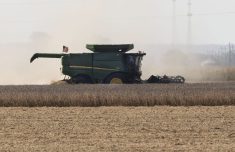Saskatchewan’s efforts to establish provincial wheat and barley commissions have taken another step forward.
Saskatchewan agriculture minister Lyle Stewart announced today that two interim committees have been formed to oversee the creation of permanent wheat and barley commissions in the province.
The interim committees — one for wheat and one for barley — held their inaugural planning meetings earlier this month.
Membership on the wheat committee includes wheat growers Gerrid Gust, David Marit, Norm Hall, Joan Heath and Cherilyn Nagel.
Barley committee members are Bill Cooper, Bill Copeland, Todd Lewis, Tom Hewson and Dennis Fuglerud.
Read Also

Russia’s seaborne grain exports fell 10 per cent year-on-year in September, data shows
Russia’s seaborne grain exports fell to 5.1 million metric tons in September, 10.1 per cent down on the same month of 2024, according to shipping data.
The groups will continue to meet in the coming months to discuss commission governance, election processes, budgets and contributions to wheat and barley research.
Plans to establish wheat and barley commissions in Saskatchewan have been in the works for several months.
The Agricultural Producers Association of Saskatchewan passed a resolution in March proposing that it spearhead efforts to establish the commissions.
APAS members felt that legislative changes affecting the CWB would leave a void in wheat research, grain quality assurance, market development, product branding and farmer advocacy.
Since then, the provincial government has stepped in to spearhead the efforts.
Saskatchewan’s new commissions are expected to be operating by August 2013.
Until then, the Alberta Barley Commission will collect refundable producer levies on behalf of Saskatchewan’s wheat and barley producers.
Prior to Aug.1, the CWB had been in charge of collecting refundable producer checkoffs on all wheat and barley produced on the Prairies.
Checkoffs were deducted directly from farmers’ grain cheques, but changes to the CWB Act made it necessary to come up with a new collection system.
Stewart said levy rates for wheat and barley have already been established at 48 cents per tonne for wheat and 56 cents per tonne for barley and are not expected to change in the near future.
Producer levies play a key role in funding cereal research that benefits the province’s farmers.
They also help pay for the development of new wheat and barley varieties that are adapted to growing conditions in Western Canada.
Most of the revenue collected through producer levies is directed to individual research projects and breeding programs through the Western Grains Research Foundation.
In 2011, the WGRF received more than $6.1 million through wheat checkoffs collected across Western Canada and nearly $700,000 through barley checkoffs.

















